Developing a Diversity Plan for the Ghana Armed Forces: Case Study
VerifiedAdded on 2020/12/29
|9
|1365
|408
Case Study
AI Summary
This case study examines the diversity challenges within the Ghana Armed Forces, highlighting issues like harassment and conflicts stemming from a lack of equality. The report analyzes the current state of the workforce, identifies stakeholders, and outlines the benefits of embracing diversity, such as fostering a positive culture and increasing productivity. A comprehensive diversity plan is proposed, including flexible working hours and hiring policies, supported by relevant legislation like the National Labour Law and Labour Act 2003. Key Performance Indicators (KPIs) are defined to measure the plan's success, along with a detailed action plan allocating responsibilities and timelines. The implementation strategy involves changes to recruitment, selection, and evaluation processes, with a dedicated individual monitoring the plan. The conclusion emphasizes the importance of diversity policies for the Ghana Armed Forces, and recommendations are provided to improve the plan's effectiveness, such as forming a committee for evaluation and establishing a clear timeframe for activities.
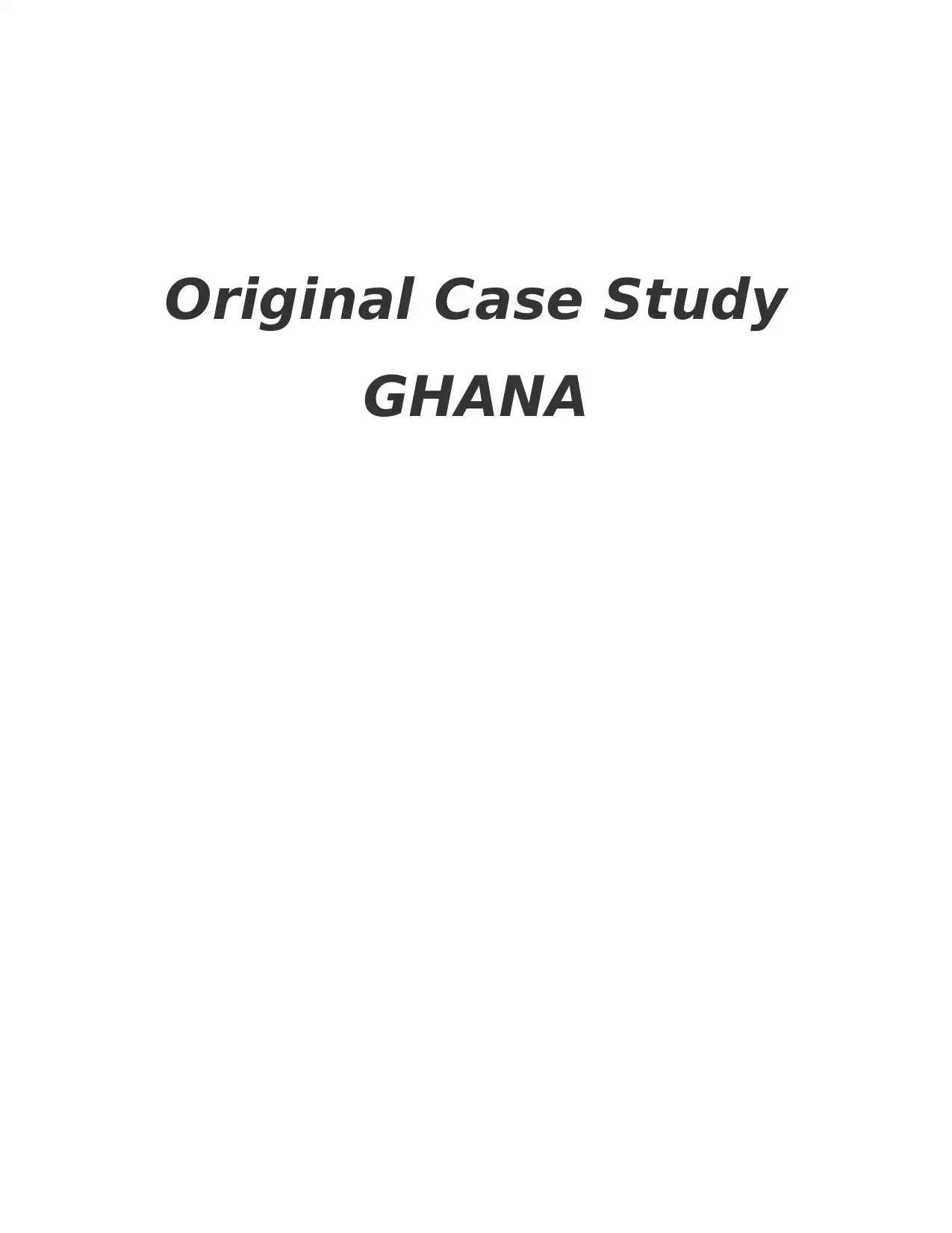
Original Case Study
GHANA
GHANA
Paraphrase This Document
Need a fresh take? Get an instant paraphrase of this document with our AI Paraphraser
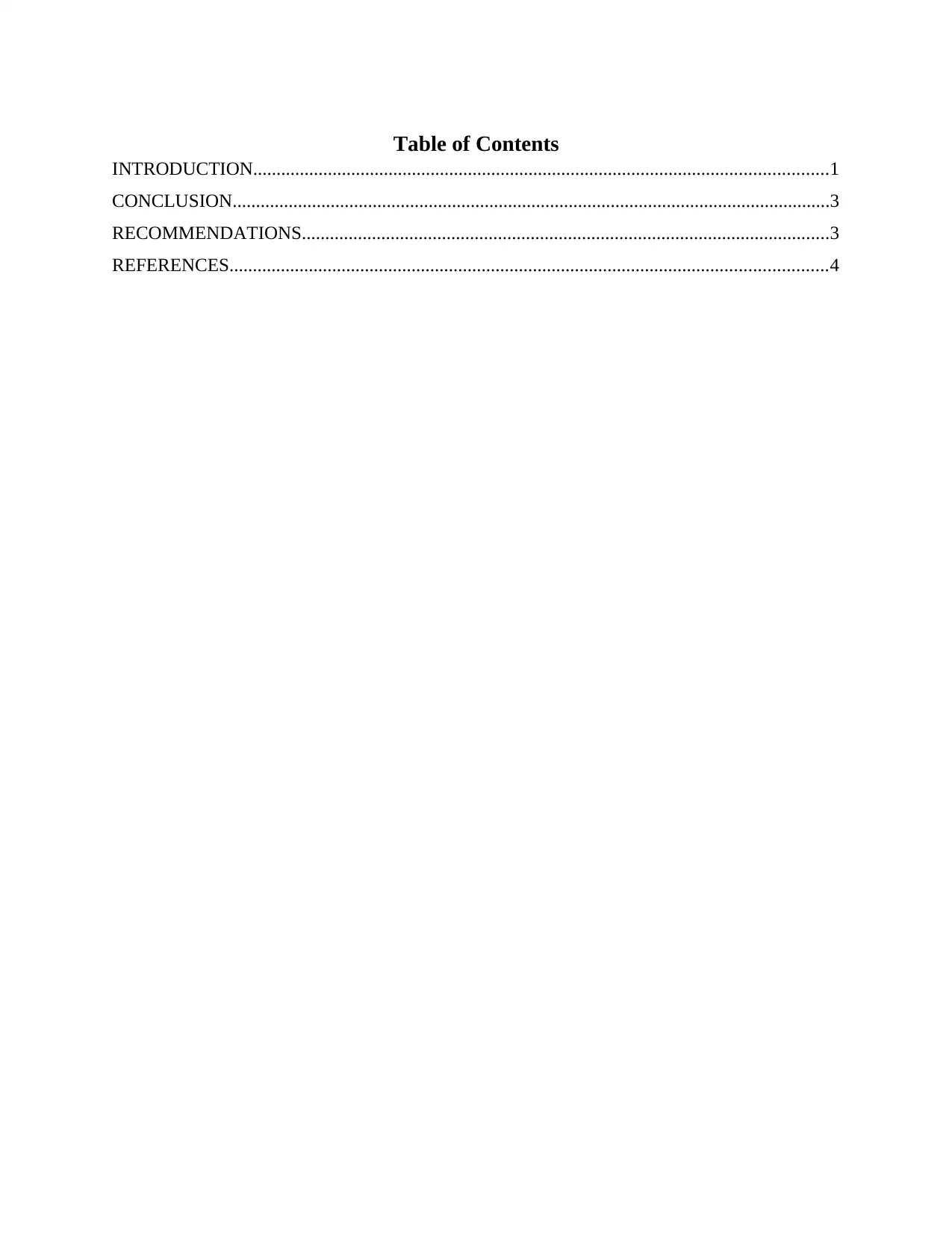
Table of Contents
INTRODUCTION...........................................................................................................................1
CONCLUSION................................................................................................................................3
RECOMMENDATIONS.................................................................................................................3
REFERENCES................................................................................................................................4
INTRODUCTION...........................................................................................................................1
CONCLUSION................................................................................................................................3
RECOMMENDATIONS.................................................................................................................3
REFERENCES................................................................................................................................4
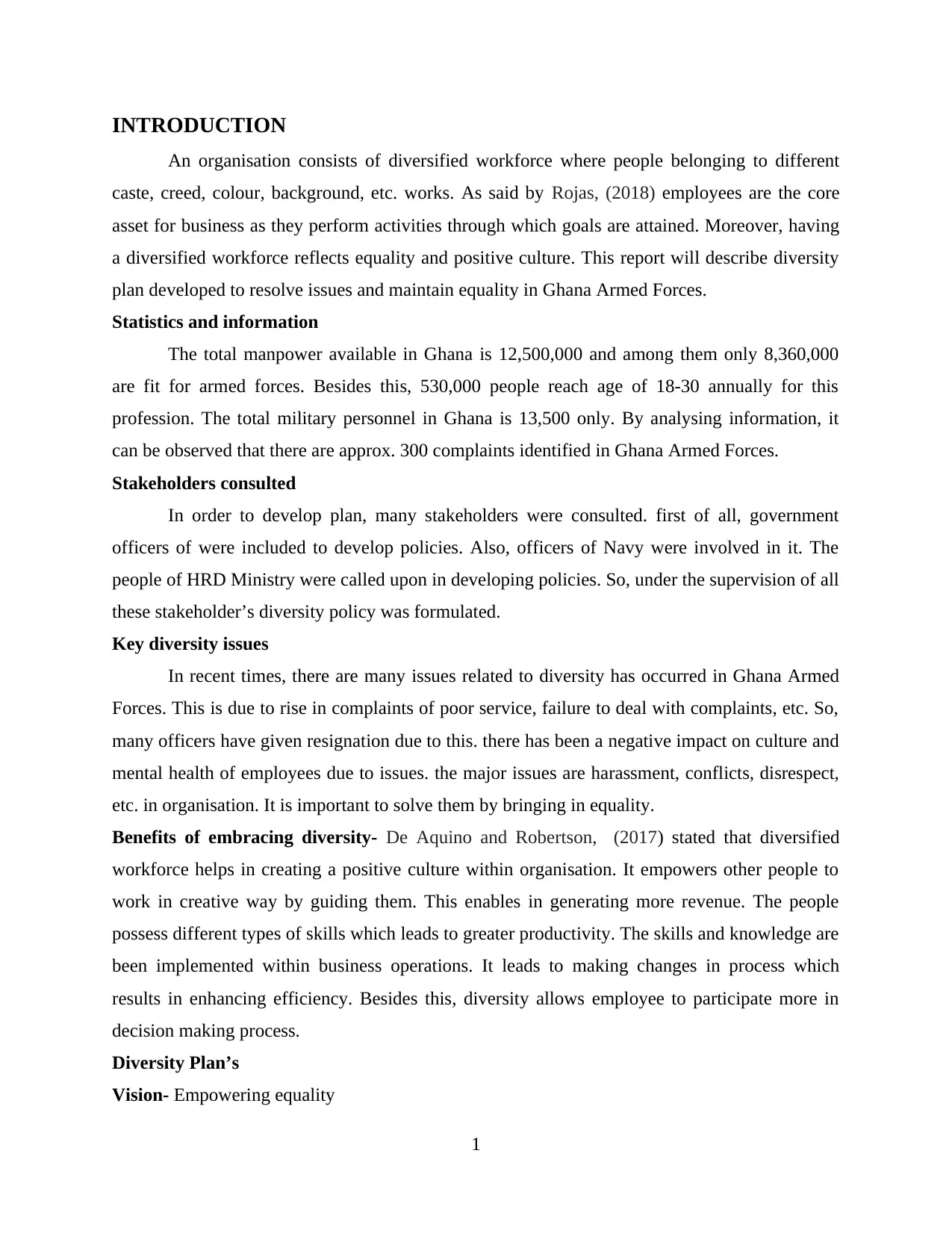
INTRODUCTION
An organisation consists of diversified workforce where people belonging to different
caste, creed, colour, background, etc. works. As said by Rojas, (2018) employees are the core
asset for business as they perform activities through which goals are attained. Moreover, having
a diversified workforce reflects equality and positive culture. This report will describe diversity
plan developed to resolve issues and maintain equality in Ghana Armed Forces.
Statistics and information
The total manpower available in Ghana is 12,500,000 and among them only 8,360,000
are fit for armed forces. Besides this, 530,000 people reach age of 18-30 annually for this
profession. The total military personnel in Ghana is 13,500 only. By analysing information, it
can be observed that there are approx. 300 complaints identified in Ghana Armed Forces.
Stakeholders consulted
In order to develop plan, many stakeholders were consulted. first of all, government
officers of were included to develop policies. Also, officers of Navy were involved in it. The
people of HRD Ministry were called upon in developing policies. So, under the supervision of all
these stakeholder’s diversity policy was formulated.
Key diversity issues
In recent times, there are many issues related to diversity has occurred in Ghana Armed
Forces. This is due to rise in complaints of poor service, failure to deal with complaints, etc. So,
many officers have given resignation due to this. there has been a negative impact on culture and
mental health of employees due to issues. the major issues are harassment, conflicts, disrespect,
etc. in organisation. It is important to solve them by bringing in equality.
Benefits of embracing diversity- De Aquino and Robertson, (2017) stated that diversified
workforce helps in creating a positive culture within organisation. It empowers other people to
work in creative way by guiding them. This enables in generating more revenue. The people
possess different types of skills which leads to greater productivity. The skills and knowledge are
been implemented within business operations. It leads to making changes in process which
results in enhancing efficiency. Besides this, diversity allows employee to participate more in
decision making process.
Diversity Plan’s
Vision- Empowering equality
1
An organisation consists of diversified workforce where people belonging to different
caste, creed, colour, background, etc. works. As said by Rojas, (2018) employees are the core
asset for business as they perform activities through which goals are attained. Moreover, having
a diversified workforce reflects equality and positive culture. This report will describe diversity
plan developed to resolve issues and maintain equality in Ghana Armed Forces.
Statistics and information
The total manpower available in Ghana is 12,500,000 and among them only 8,360,000
are fit for armed forces. Besides this, 530,000 people reach age of 18-30 annually for this
profession. The total military personnel in Ghana is 13,500 only. By analysing information, it
can be observed that there are approx. 300 complaints identified in Ghana Armed Forces.
Stakeholders consulted
In order to develop plan, many stakeholders were consulted. first of all, government
officers of were included to develop policies. Also, officers of Navy were involved in it. The
people of HRD Ministry were called upon in developing policies. So, under the supervision of all
these stakeholder’s diversity policy was formulated.
Key diversity issues
In recent times, there are many issues related to diversity has occurred in Ghana Armed
Forces. This is due to rise in complaints of poor service, failure to deal with complaints, etc. So,
many officers have given resignation due to this. there has been a negative impact on culture and
mental health of employees due to issues. the major issues are harassment, conflicts, disrespect,
etc. in organisation. It is important to solve them by bringing in equality.
Benefits of embracing diversity- De Aquino and Robertson, (2017) stated that diversified
workforce helps in creating a positive culture within organisation. It empowers other people to
work in creative way by guiding them. This enables in generating more revenue. The people
possess different types of skills which leads to greater productivity. The skills and knowledge are
been implemented within business operations. It leads to making changes in process which
results in enhancing efficiency. Besides this, diversity allows employee to participate more in
decision making process.
Diversity Plan’s
Vision- Empowering equality
1
⊘ This is a preview!⊘
Do you want full access?
Subscribe today to unlock all pages.

Trusted by 1+ million students worldwide
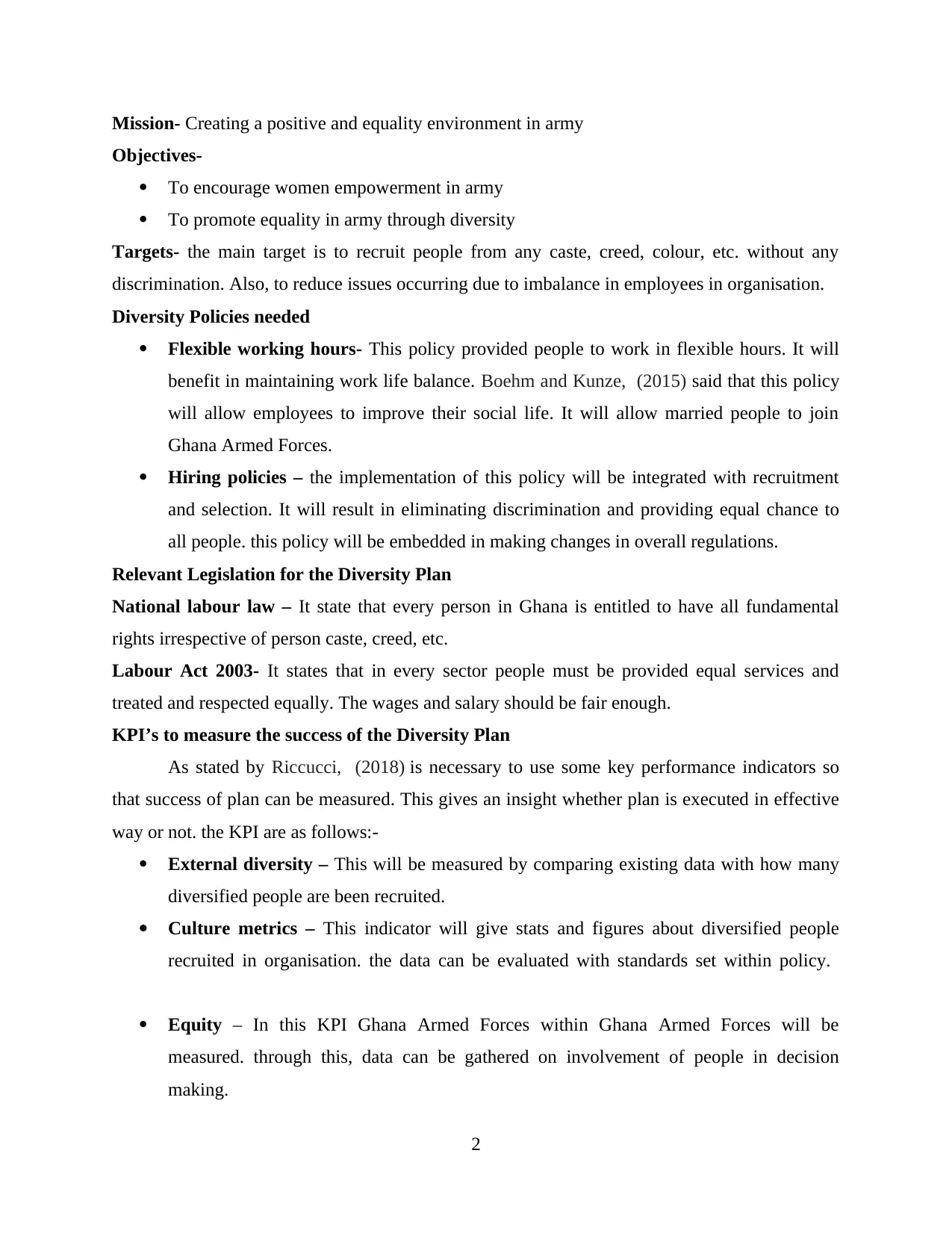
Mission- Creating a positive and equality environment in army
Objectives-
To encourage women empowerment in army
To promote equality in army through diversity
Targets- the main target is to recruit people from any caste, creed, colour, etc. without any
discrimination. Also, to reduce issues occurring due to imbalance in employees in organisation.
Diversity Policies needed
Flexible working hours- This policy provided people to work in flexible hours. It will
benefit in maintaining work life balance. Boehm and Kunze, (2015) said that this policy
will allow employees to improve their social life. It will allow married people to join
Ghana Armed Forces.
Hiring policies – the implementation of this policy will be integrated with recruitment
and selection. It will result in eliminating discrimination and providing equal chance to
all people. this policy will be embedded in making changes in overall regulations.
Relevant Legislation for the Diversity Plan
National labour law – It state that every person in Ghana is entitled to have all fundamental
rights irrespective of person caste, creed, etc.
Labour Act 2003- It states that in every sector people must be provided equal services and
treated and respected equally. The wages and salary should be fair enough.
KPI’s to measure the success of the Diversity Plan
As stated by Riccucci, (2018) is necessary to use some key performance indicators so
that success of plan can be measured. This gives an insight whether plan is executed in effective
way or not. the KPI are as follows:-
External diversity – This will be measured by comparing existing data with how many
diversified people are been recruited.
Culture metrics – This indicator will give stats and figures about diversified people
recruited in organisation. the data can be evaluated with standards set within policy.
Equity – In this KPI Ghana Armed Forces within Ghana Armed Forces will be
measured. through this, data can be gathered on involvement of people in decision
making.
2
Objectives-
To encourage women empowerment in army
To promote equality in army through diversity
Targets- the main target is to recruit people from any caste, creed, colour, etc. without any
discrimination. Also, to reduce issues occurring due to imbalance in employees in organisation.
Diversity Policies needed
Flexible working hours- This policy provided people to work in flexible hours. It will
benefit in maintaining work life balance. Boehm and Kunze, (2015) said that this policy
will allow employees to improve their social life. It will allow married people to join
Ghana Armed Forces.
Hiring policies – the implementation of this policy will be integrated with recruitment
and selection. It will result in eliminating discrimination and providing equal chance to
all people. this policy will be embedded in making changes in overall regulations.
Relevant Legislation for the Diversity Plan
National labour law – It state that every person in Ghana is entitled to have all fundamental
rights irrespective of person caste, creed, etc.
Labour Act 2003- It states that in every sector people must be provided equal services and
treated and respected equally. The wages and salary should be fair enough.
KPI’s to measure the success of the Diversity Plan
As stated by Riccucci, (2018) is necessary to use some key performance indicators so
that success of plan can be measured. This gives an insight whether plan is executed in effective
way or not. the KPI are as follows:-
External diversity – This will be measured by comparing existing data with how many
diversified people are been recruited.
Culture metrics – This indicator will give stats and figures about diversified people
recruited in organisation. the data can be evaluated with standards set within policy.
Equity – In this KPI Ghana Armed Forces within Ghana Armed Forces will be
measured. through this, data can be gathered on involvement of people in decision
making.
2
Paraphrase This Document
Need a fresh take? Get an instant paraphrase of this document with our AI Paraphraser
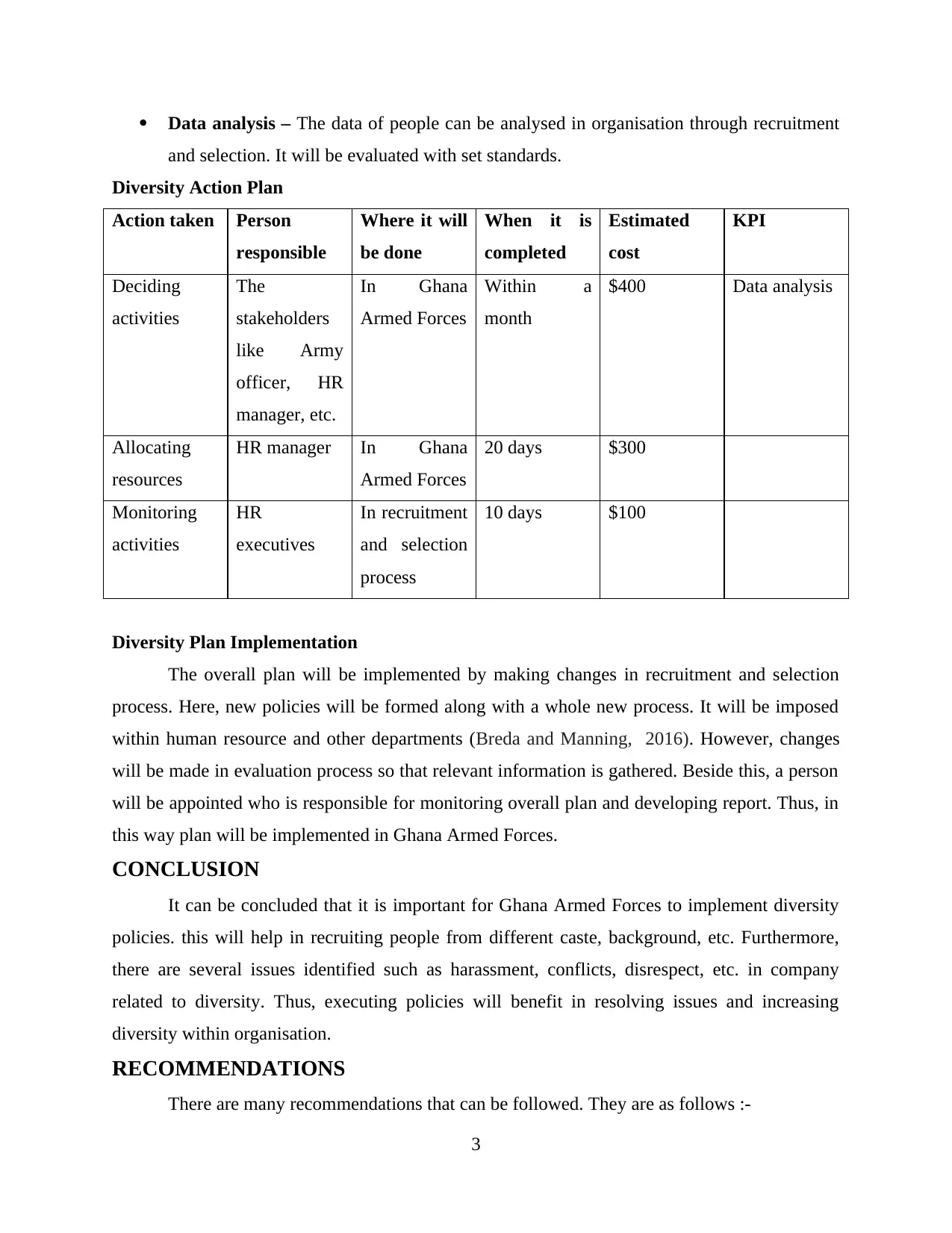
Data analysis – The data of people can be analysed in organisation through recruitment
and selection. It will be evaluated with set standards.
Diversity Action Plan
Action taken Person
responsible
Where it will
be done
When it is
completed
Estimated
cost
KPI
Deciding
activities
The
stakeholders
like Army
officer, HR
manager, etc.
In Ghana
Armed Forces
Within a
month
$400 Data analysis
Allocating
resources
HR manager In Ghana
Armed Forces
20 days $300
Monitoring
activities
HR
executives
In recruitment
and selection
process
10 days $100
Diversity Plan Implementation
The overall plan will be implemented by making changes in recruitment and selection
process. Here, new policies will be formed along with a whole new process. It will be imposed
within human resource and other departments (Breda and Manning, 2016). However, changes
will be made in evaluation process so that relevant information is gathered. Beside this, a person
will be appointed who is responsible for monitoring overall plan and developing report. Thus, in
this way plan will be implemented in Ghana Armed Forces.
CONCLUSION
It can be concluded that it is important for Ghana Armed Forces to implement diversity
policies. this will help in recruiting people from different caste, background, etc. Furthermore,
there are several issues identified such as harassment, conflicts, disrespect, etc. in company
related to diversity. Thus, executing policies will benefit in resolving issues and increasing
diversity within organisation.
RECOMMENDATIONS
There are many recommendations that can be followed. They are as follows :-
3
and selection. It will be evaluated with set standards.
Diversity Action Plan
Action taken Person
responsible
Where it will
be done
When it is
completed
Estimated
cost
KPI
Deciding
activities
The
stakeholders
like Army
officer, HR
manager, etc.
In Ghana
Armed Forces
Within a
month
$400 Data analysis
Allocating
resources
HR manager In Ghana
Armed Forces
20 days $300
Monitoring
activities
HR
executives
In recruitment
and selection
process
10 days $100
Diversity Plan Implementation
The overall plan will be implemented by making changes in recruitment and selection
process. Here, new policies will be formed along with a whole new process. It will be imposed
within human resource and other departments (Breda and Manning, 2016). However, changes
will be made in evaluation process so that relevant information is gathered. Beside this, a person
will be appointed who is responsible for monitoring overall plan and developing report. Thus, in
this way plan will be implemented in Ghana Armed Forces.
CONCLUSION
It can be concluded that it is important for Ghana Armed Forces to implement diversity
policies. this will help in recruiting people from different caste, background, etc. Furthermore,
there are several issues identified such as harassment, conflicts, disrespect, etc. in company
related to diversity. Thus, executing policies will benefit in resolving issues and increasing
diversity within organisation.
RECOMMENDATIONS
There are many recommendations that can be followed. They are as follows :-
3
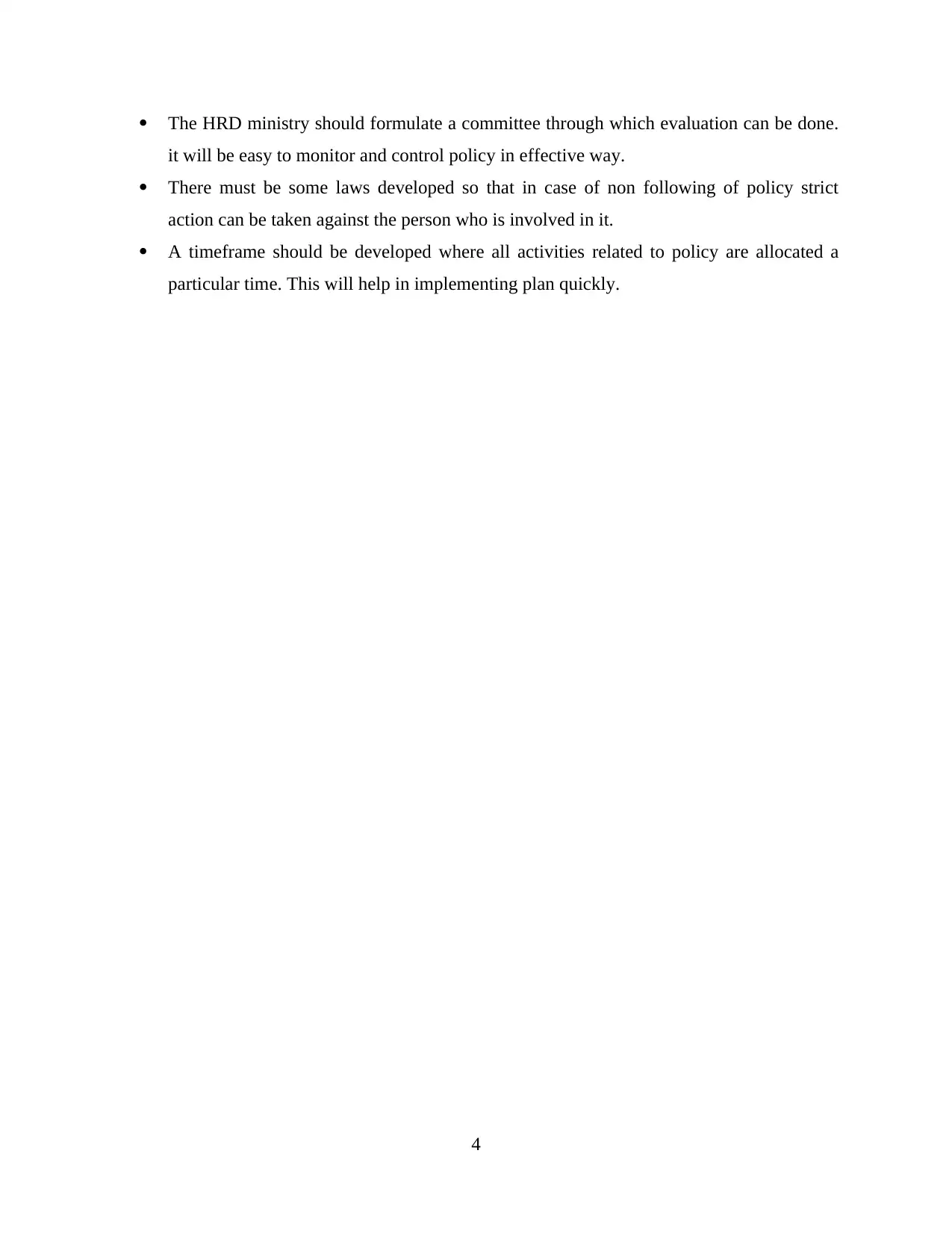
The HRD ministry should formulate a committee through which evaluation can be done.
it will be easy to monitor and control policy in effective way.
There must be some laws developed so that in case of non following of policy strict
action can be taken against the person who is involved in it.
A timeframe should be developed where all activities related to policy are allocated a
particular time. This will help in implementing plan quickly.
4
it will be easy to monitor and control policy in effective way.
There must be some laws developed so that in case of non following of policy strict
action can be taken against the person who is involved in it.
A timeframe should be developed where all activities related to policy are allocated a
particular time. This will help in implementing plan quickly.
4
⊘ This is a preview!⊘
Do you want full access?
Subscribe today to unlock all pages.

Trusted by 1+ million students worldwide
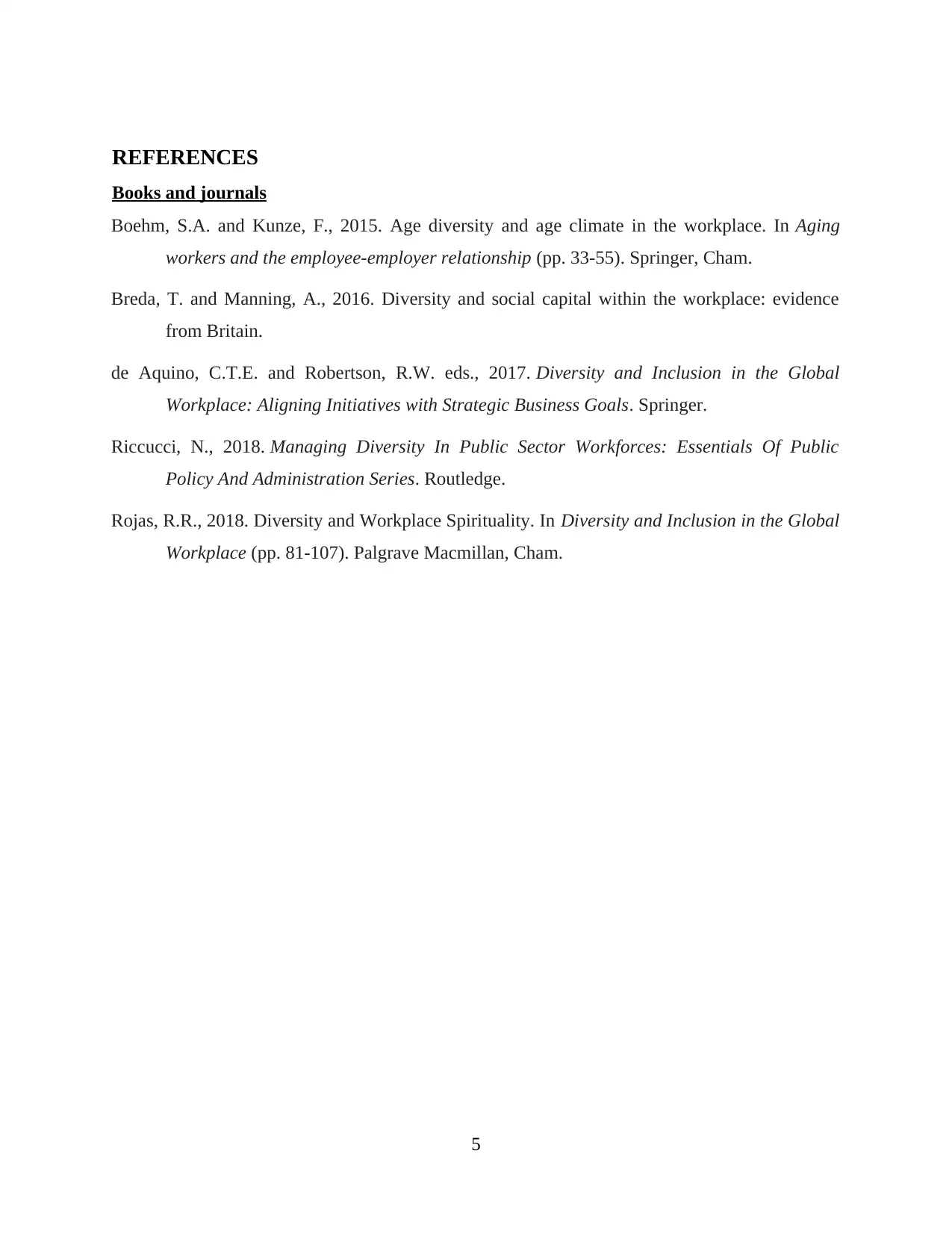
REFERENCES
Books and journals
Boehm, S.A. and Kunze, F., 2015. Age diversity and age climate in the workplace. In Aging
workers and the employee-employer relationship (pp. 33-55). Springer, Cham.
Breda, T. and Manning, A., 2016. Diversity and social capital within the workplace: evidence
from Britain.
de Aquino, C.T.E. and Robertson, R.W. eds., 2017. Diversity and Inclusion in the Global
Workplace: Aligning Initiatives with Strategic Business Goals. Springer.
Riccucci, N., 2018. Managing Diversity In Public Sector Workforces: Essentials Of Public
Policy And Administration Series. Routledge.
Rojas, R.R., 2018. Diversity and Workplace Spirituality. In Diversity and Inclusion in the Global
Workplace (pp. 81-107). Palgrave Macmillan, Cham.
5
Books and journals
Boehm, S.A. and Kunze, F., 2015. Age diversity and age climate in the workplace. In Aging
workers and the employee-employer relationship (pp. 33-55). Springer, Cham.
Breda, T. and Manning, A., 2016. Diversity and social capital within the workplace: evidence
from Britain.
de Aquino, C.T.E. and Robertson, R.W. eds., 2017. Diversity and Inclusion in the Global
Workplace: Aligning Initiatives with Strategic Business Goals. Springer.
Riccucci, N., 2018. Managing Diversity In Public Sector Workforces: Essentials Of Public
Policy And Administration Series. Routledge.
Rojas, R.R., 2018. Diversity and Workplace Spirituality. In Diversity and Inclusion in the Global
Workplace (pp. 81-107). Palgrave Macmillan, Cham.
5
Paraphrase This Document
Need a fresh take? Get an instant paraphrase of this document with our AI Paraphraser

6

7
⊘ This is a preview!⊘
Do you want full access?
Subscribe today to unlock all pages.

Trusted by 1+ million students worldwide
1 out of 9
Related Documents
Your All-in-One AI-Powered Toolkit for Academic Success.
+13062052269
info@desklib.com
Available 24*7 on WhatsApp / Email
![[object Object]](/_next/static/media/star-bottom.7253800d.svg)
Unlock your academic potential
Copyright © 2020–2026 A2Z Services. All Rights Reserved. Developed and managed by ZUCOL.




